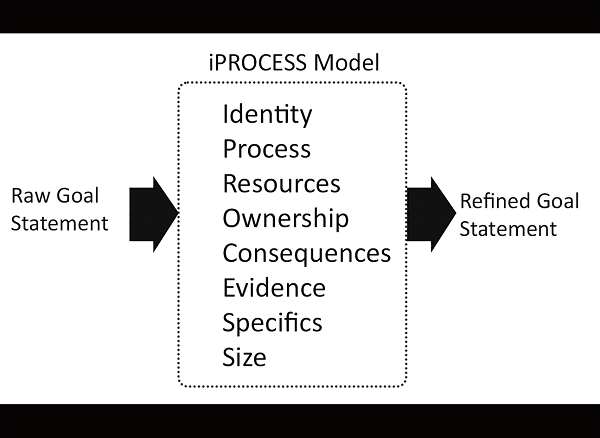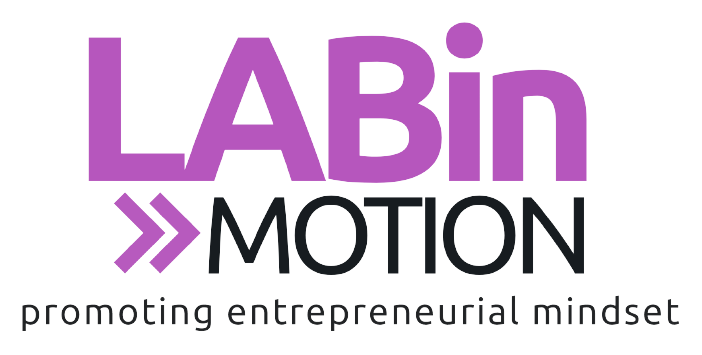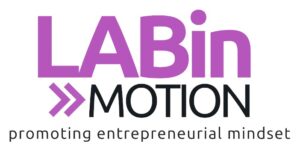How can you define and articulate goals that are realistic, specific, aligned to your values and easily understood by all concerned? It is recommended that goals be written down and stuck in a place that is visible to you so that it gets internalized over a period of time. The iPROCESS model enables you to think through and structure your goals. When an entrepreneur or marketer is looking at generating new ideas, it is important not to forget the context in which the ideas are being generated. Else, it could become a case of missing the woods for the trees! How to generate new ideas is taken up in a different article.
You can list down the five most important goals that you have for yourself, in a way that makes it comfortable and understandable to you. There are eight important questions that you need to ask about these goals. When you have thought them through, then your goals will be realistic, achievable and motivating.

Identity – Are the goals in line with your values, with your identity and who you are as a person? If not, you need to work on re-framing the goal or address the conflict between the goal and your identity.
Positive – Describe your goal in positive terms. Mention what you want and not what you do not want. All resources, efforts and time can be directed towards accomplishing the new positive goal and this makes it more achievable. For example, instead of “I do not want to take up assignments where I would earn less than 25% gross margins,” make your goal “I want to take up assignments where the gross margin is 25% or more!”
Resources – What resources do you have? Put them down under the following five categories – Objects, People, Role Models, Personal Qualities, Money.
Ownership– Is the goal in your control? There is evidence to support the theory that one should expect to succeed to the extent that one feels in control of one’s successes and failures. Not knowing the cause of one’s successes and failures undermines one’s motivation to work on the associated tasks. People who believe that they control their outcomes feel more competent. For example, ask yourself if the following goals are in your control: “I want to make my customers happy” or “I want to be ranked in the first 500 of the JEE exam.” Well, these are goals that are, perhaps, not in your control. For instance, at best you could only provide the strategies that are likely to meet the needs of the customer, you can’t ensure that they are happy.
Instead, you could define your goal as ensuring that customer turnaround time is reduced by 50%, or as providing 24/7 support for your customers. These are specific areas that are in your control and are likely to make your customers happy. Similarly, getting a rank in the top 500 in a competitive exam is a relative measure that is not in your control and could instead be rephrased as “I want to get more than a 60% net score.” This is likely to translate into getting into the top 500, but you have a better sense of control of your goal.
Consequences– The consequences of achieving your outcome are likely to have an impact on the environment around you, on people, processes and objects. Working towards an outcome that is oblivious to the ecology can have an overall adverse impact on the desired outcome. The questions to be asked are, “What are the wider consequences? What is the opportunity cost? Who else will be affected and in what way? How will others feel? What will you have to give up? What is good about the present situation? What is it that you want to keep?”
For instance, if your goal is to grow your sales by 200% by the end of the year, it might require putting in 12-hour work days and undertake extensive travel. This would mean you would have reduced family time with your kids, limited time for pursuing your hobbies and fewer moments for socializing with friends. Would you be willing to give up these things, without a feeling of guilt or remorse, to achieve your goal?
Evidence – How will you know you are succeeding or have succeeded? It is important to know when you are on track to achieving your desired outcome. You need the right feedback in the right quantity and it needs to be accurate. The goal must be demonstrable in sensory terms both to you and to others. The only way in which an outcome is going to be useful is if you are able to perceive and evaluate progress as you attempt to achieve it. How does the outcome look, feel and smell? The richer the description, the more you will empower your brain to create the desire to make the goal more attractive. Know how you will look, how you will feel, what you will see and hear after you achieved the outcome.
For example, when your goal is specific such as “increasing sales by 100% in one year, getting at least two 50-million-dollar new accounts, increasing billable head count by 500 people”, it is easy to track your progress.
Specifics – Where, When and with Whom? What is the context in which you wish to achieve the goal? Having goals as universal quantifiers or absolutes implies that the outcome is wanted in all contexts and for all circumstances, while in actuality the outcome may be useful and appropriate only in some context, e.g., “I want to be informed about every sales transaction made by the sales team on a daily basis” (do you always want all these details, or are there times when not knowing these details is acceptable and appropriate?)
If you have a goal to become a writer, it would help if you are specific about the context and the time frame. Instead of stating a goal like ” I want to become a writer,” you can be more specific and change it to “I want to write a book for teenagers in India and complete the manuscript in the next 4 months.” The goals need not be grandiose. If you wish to make a wonderful dish for your guests, you may like to state your goals in clear terms. Instead of “I want to be a great cook” state something like “I want to make a couple of vegetarian paneer dishes for my guests who are coming home this Sunday”.
Size – Does the goal lend itself to chunking? If the goal is overwhelming or appears to be complex and big, can you chunk it down to manageable parts? Would you be able to delegate work, if necessary, to others to accomplish parts of the tasks? If your goal is to write a book on fiction for teenagers before the end of this year, the goal can be overwhelming. Can you chunk the book writing process into manageable parts by defining things like the number of pages in one week, the number of chapters per month, or number of hours of writing per day?
If you want to achieve a 100% increase in sales for the next year, can you chunk the sales targets into weekly, monthly, quarterly, six-monthly targets that can be tracked and monitored closely?
In the context of a business, one of the goals may be to explore strategies to meet customer needs. But how does one know what the customer is needing? The Customer-Action-Cycle framework is a powerful model to help marketers discover customer needs. This is covered in a separate article.





